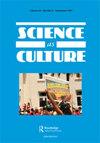Democratising Monograph Publishing or Preying on Researchers? Scholarly Recognition and Global ‘Credibility Economies’
IF 2.4
3区 哲学
Q1 CULTURAL STUDIES
引用次数: 1
Abstract
ABSTRACT As the global university sector continues to expand, ever more academic work is being published, including growing numbers of academic monographs. Digital technologies open up opportunities for publishers to reach new academic communities. Drawing on interviews with authors and publishers, case-studies of two companies - Lambert Academic Publishing (Lambert) and Cambridge Scholars Publishing (CSP) - interrogate their inclusive, author-centred visions. Conceptualisations of academic ‘credibility economies' strain to account for the different rationales academics have for publishing their work across a fragmented and multipolar global research system. Work has tended to focus on researchers' strategies for accumulating and managing credibility, rather than the structural blockages to, and the geographical constraints on, the flow of academic credibility. For researchers working at the margins of existing credibility economies, publishing an academic monograph is also about gaining global visibility and recognition. Promising to democratise publishing, the two publishers have both been accused of ‘predatory' business practices. In response, CSP has sought to accumulate scholarly credibility, whilst Lambert rejects what it calls ‘traditional' approaches to evaluating reputation and legitimacy. The two case-studies support a postcolonial critique of the ‘predatory publishing’ discourse, highlighting the exclusions and effacements enacted by the global academic publishing ecosystem.专著出版民主化还是掠夺研究人员?学术认可与全球“诚信经济”
随着全球大学领域的不断扩大,越来越多的学术著作被出版,包括越来越多的学术专著。数字技术为出版商接触新的学术群体提供了机会。兰伯特学术出版公司(Lambert Academic Publishing)和剑桥学者出版公司(Cambridge Scholars Publishing)对两家公司进行了案例研究,通过对作者和出版商的采访,探讨了他们包容的、以作者为中心的愿景。学术“信誉经济”的概念难以解释学者在一个碎片化和多极的全球研究体系中发表他们的工作的不同理由。工作的重点往往是研究人员积累和管理可信度的策略,而不是学术可信度流动的结构性障碍和地理限制。对于在现有信誉经济边缘工作的研究人员来说,出版学术专著也意味着获得全球知名度和认可。这两家出版商都承诺要使出版民主化,但却都被指责为“掠夺性”的商业行为。作为回应,CSP寻求积累学术信誉,而Lambert拒绝所谓的评估声誉和合法性的“传统”方法。这两个案例研究支持了对“掠夺性出版”话语的后殖民批判,强调了全球学术出版生态系统所实施的排斥和淡化。
本文章由计算机程序翻译,如有差异,请以英文原文为准。
求助全文
约1分钟内获得全文
求助全文
来源期刊

Science As Culture
Multiple-
CiteScore
5.20
自引率
3.80%
发文量
28
期刊介绍:
Our culture is a scientific one, defining what is natural and what is rational. Its values can be seen in what are sought out as facts and made as artefacts, what are designed as processes and products, and what are forged as weapons and filmed as wonders. In our daily experience, power is exercised through expertise, e.g. in science, technology and medicine. Science as Culture explores how all these shape the values which contend for influence over the wider society. Science mediates our cultural experience. It increasingly defines what it is to be a person, through genetics, medicine and information technology. Its values get embodied and naturalized in concepts, techniques, research priorities, gadgets and advertising. Many films, artworks and novels express popular concerns about these developments. In a society where icons of progress are drawn from science, technology and medicine, they are either celebrated or demonised. Often their progress is feared as ’unnatural’, while their critics are labelled ’irrational’. Public concerns are rebuffed by ostensibly value-neutral experts and positivist polemics. Yet the culture of science is open to study like any other culture. Cultural studies analyses the role of expertise throughout society. Many journals address the history, philosophy and social studies of science, its popularisation, and the public understanding of society.
 求助内容:
求助内容: 应助结果提醒方式:
应助结果提醒方式:


